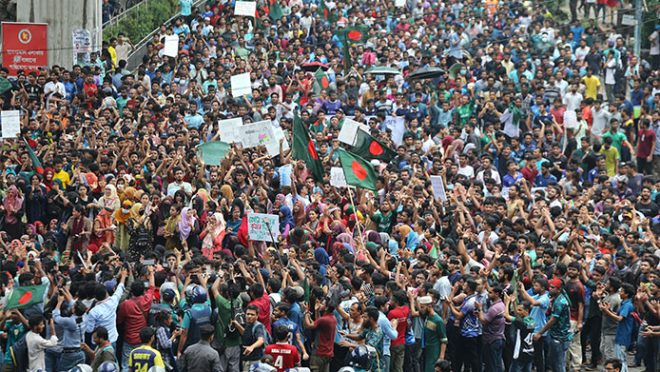Shahbagh rages against quota system once more: What’s happening?
Shahbagh rages against quota system once more: What’s happening?

On 4 June, Shahbagh intersection was blockaded for the third consecutive day due to protest against the quota system in first and second-grade government jobs.
Around 5,000 students from various public universities, including Dhaka University, Jahangirnagar University, Chittagong University and Bangladesh Agricultural University organised protest marches and gathered in Shahbag, chanting slogans and waving the flag of Bangladesh.
In December 2021, a High Court decision reignited a heated debate over Bangladesh’s Freedom Fighter Quota (FFQ), challenging the government’s 2018 decision to abolish it.
The anticipated ruling of the Supreme Court on 4 July has been postponed until further notice, making the situation more complicated.
Students have been at the forefront of protests, gathering in Shahbagh and other places, vehemently opposing the High Court’s ruling that deemed the cancellation of the FFQ illegal. This issue is not just about jobs; it’s about history, justice, and fairness.
Back in 1972, shortly after Bangladesh gained independence, the government introduced the quota system to ensure fair representation in government jobs. This system allocated positions based on merit (20%), freedom fighters (30%), war-affected women (10%), and district population (40%). This was later amended to 30% for freedom fighters’ children and grandchildren, 10% for women, 10% for people of underdeveloped districts, 5% for members of indigenous communities and 1% for the physically challenged.
Over time, the quota system became a point of contention. In 2018, following widespread student protests calling for reforms, the government decided to abolish the quota system for certain job categories, citing the need for merit-based selection and efficiency in public service.
However, the High Court’s recent ruling challenged this decision, questioning its legality and reigniting protests across universities. Students argue that abolishing the FFQ undermines the sacrifices made during the Liberation War and neglects the historical context in which the quota was introduced.
If the Supreme Court rules in favour of reinstating the FFQ, it could spark more protests and political tensions.
From a legal standpoint, the debate centres on constitutional principles of equality and the judiciary’s role in safeguarding these principles. The High Court’s intervention suggests a belief in its authority to review government decisions for constitutionality, a power crucial for upholding democratic values.
For students, this issue is personal and profound. They argue for a system that rewards merit but also recognises the sacrifices of freedom fighters. They demand reforms that ensure fair opportunities for all, addressing shortcomings in the current quota system while preserving its core principles.
The history of the quota system reflects a journey of policy, protest, and reform. Since its inception, various committees and commissions have recommended adjustments to better align with changing societal needs and ensure fairness in recruitment.
As protests continue and the Supreme Court’s ruling looms, students remain committed to their cause. They seek not only a fair resolution to the FFQ debate but also a reaffirmation of Bangladesh’s commitment to honouring its history and promoting justice in public service.


